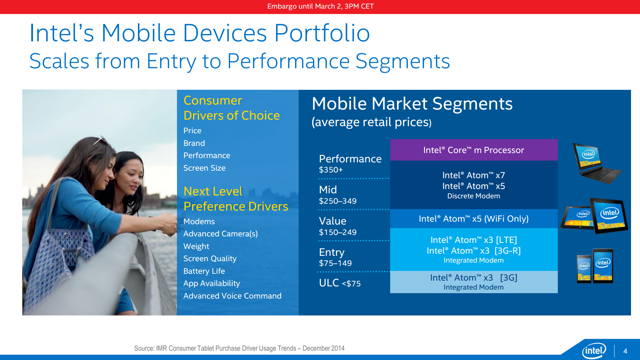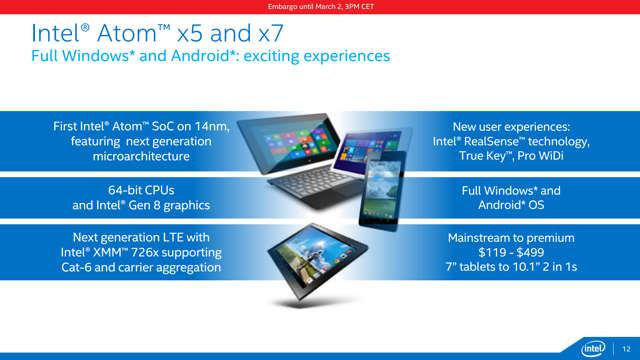Microsoft is set to release new devices on October 6, which may include Intel-based Windows smartphones.
Although a Windows Phone with Intel Inside would be an improvement over the Lumia line, these phones still won't be competitive with Apple's iPhone 6s.
This is because Intel deliberately positioned its smartphone processors for the low end of the market.
Microsoft's (NASDAQ:MSFT) October 6 event to announce new Windows 10 devices has stimulated speculation that these might include an upgraded line of Windows Phones featuring Intel processors. Microsoft moving to an all-Intel (NASDAQ:INTC) platform for PCs, tablets and phones would be great for both companies and for consumers. However, Intel-based phones cannot hope to compete in the same league as Apple's (NASDAQ:AAPL) iPhone 6s until late 2016 at the earliest.
Lumia AbandonedThe deficiency in Intel's current Atom line-up relative to Apple's iPhone 6 and 6s was brought home to me indirectly by an article by SA contributor Alcaraz Research, which argued, I think persuasively, that Microsoft should abandon the legacy Lumia brand for a premium line of phones to be marketed under the Surface brand.
Alcaraz also argued, once again correctly, that these phones would have to be based on Intel processors in order to be full fledged Windows 10 devices capable of exploiting the Continuum feature. I agree that this is the only path forward for Windows phone. If Microsoft's mobile devices aren't part of the larger Intel-based Windows 10 ecosystem, they're nowhere.
Such phones, Alcaraz asserts, could rival the iPhone 6s. Perhaps. Alcaraz doesn't specify a time frame in which said rivalry might occur, or what Intel processor could reasonably support that rivalry. There is no Intel processor currently available that could.
The difficulty Intel-based phones have in being competitive with iPhone can be seen in the Asus (OTC:ASUUY) ZenFone 2, highlighted in another Alcaraz article. The ZenFone 2 has been out for a while and has been thoroughly reviewed by AnandTech. The ZenFone 2 runs Intel Moorefield processors, fabricated on Intel's somewhat older 22 nm process. In most of the CPU and GPU benchmarks that AnandTech ran, last year's iPhone 6 was superior to the ZenFone 2.
What about Intel's newer Atom x3 series of SoFIA smartphone SOCs? Even Intel isn't trying to position these in the premium tier, as the chart below from AnandTech shows:
(click to enlarge)
Intel's x3 processors use the same CPU core design (Silvermont) as the Moorefield processor in the ZenFone 2, but they're fabricated on a less competitive 28 nm node by TSMC (NYSE:TSM).
The Atom x5 and x7 series are fabricated on Intel's most advanced 14 nm process and feature Airmont (Silvermont with die shrink) cores and enhanced GPUs. Wouldn't the x7 be competitive with iPhone 6s? Perhaps, but it really isn't targeted for smartphones as it is for tablets, as the chart below shows:
(click to enlarge)
Not only would the x7 be inappropriate for a smartphone (primarily because of battery life), but also it's unlikely that it would outperform the A9 in the iPhone 6s. The Atom x7 has been thoroughly tested in the new Surface 3 by AnandTech. In most of the benchmarks where the iPad Air 2 could be compared, the iPad Air 2, which features last year's A8X SOC, performed better than the Surface 3. Apple has claimed roughly a 70% improvement on CPU performance and a 90% improvement on GPU performance for the A9 relative to the A8, as I have noted in a recent article.
I haven't seen any independent test data on the A9 yet, but if Apple's claims hold up, Apple's A9 will be the world's fastest smartphone SOC, even including the Atom x7.
So, the competitive landscape for Apple through the end of the year is that its top phones will offer unrivaled performance compared to any smartphone at any price point. The iPhone 6s and 6s Plus will also come with the latest generation iOS and enjoy all the benefits of the iOS ecosystem.
This is unlikely to alter until Intel moves the Atom x3 series to its own 14 nm process in 2016. Even then, this next x3 series will probably not equal the performance of the A9 since we already have a reasonable expectation of performance improvement from the move to 14 nm by virtue of the Atom x5 and x7. There really is no reason to expect Intel-based phones to achieve performance parity with the latest iPhone until Intel completely redesigns the CPU and GPU cores for Atom, which probably won't be until late 2016.
What is Premium?I often encounter the opinion expressed by Apple critics that Apple's pricing of its iPhones is all driven by marketing hype. When I point to objective metrics such as processor speed, the reply, all too often, is that these metrics don't matter. The consumer doesn't care about them, it's asserted.
I'm sure that most consumers don't base buying decisions on benchmark scores, but they do base decisions on user experience. Processing speed does affect user experience. So does operating system reliability and convenience. Since the introduction of Apple's first 64-bit smartphone SOC, the A7 in the iPhone 5s, AAPL has maintained a consistent lead in smartphone processor performance.
Most people point to the larger screen of the iPhone 6 as the most important factor in Apple's iPhone sales growth in fiscal 2015. Apple's faster SOCs were critical enablers to those larger screens. Without the faster processors, the massive increase in screen pixels in the iPhone 6 and 6 Plus would have led to noticeable performance degradation. The faster processors were essential to provide the fast and fluid experience that iOS users are accustomed to on the larger screens.
Although Apple critics may not be realistic about why Apple has been able to occupy the top tier in smartphones, I doubt that its competitors have any illusions. Microsoft CEO Nadella strikes me as both extremely intelligent and realistic. On October 6, Microsoft may well abandon the last vestiges of the failed Nokia strategy with a line of Intel-based phones. But I doubt it will be positioning them as "iPhone killers".
Disclosure: I am/we are long AAPL. (More...)I wrote this article myself, and it expresses my own opinions. I am not receiving compensation for it (other than from Seeking Alpha). I have no business relationship with any company whose stock is mentioned in this article.
Seeking Alpha PRO helps fund managers:
For an overview of our products and pricing:
Thank you for your interest in Seeking Alpha PROWe look forward to contacting you shortly for a conversation.
Thank you for your interest in Seeking Alpha PRO
Our PRO subscription service was created for fund managers, and the cost of the product is prohibitive for most individual investors. If you are an investment professional with over $1M AUM and received this message in error, click here and you will be contacted shortly.Thank you for your interest in Seeking Alpha PROWe look forward to contacting you when we have an individual investor product ready!
Already subscribed to PRO? Sign in here
Source: Apple: Even Intel Doesn't Think It's Competitive With iPhone
Comments
Post a Comment